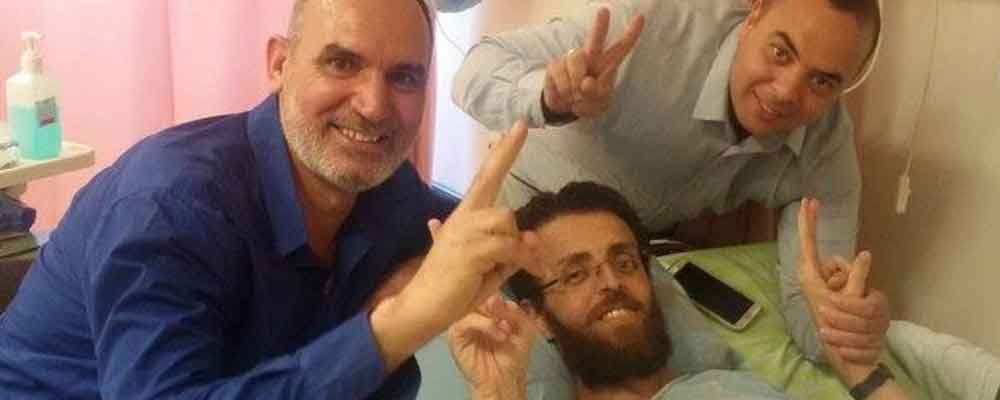Muhammad al-Qiq Ends 94-Day Hunger Strike In Deal With Israel
By Ali Abunimah
27 February, 2016
Electronicintifada.net

Muhammad al-Qiq has ended the hunger strike that brought him into uncharted medical territory and to the brink of death after 94 days without food.
The 33-year-old journalist and father of two ended his protest as part of a compromise deal with Israel to free him from detention without charge or trial.
Under the terms of the deal, announced on Friday by the Palestinian Prisoners Club, al-Qiq will be released on 21 May and his detention will not be renewed.
In the meantime, al-Qiq will continue to be treated at HaEmek hospital, instead of in the occupied West Bank, but will be in the care of a team of Palestinian doctors from inside Israel.
The days al-Qiq spent in Israeli detention after his arrest last November, but before Israel issued the administrative detention order, will be counted as part of the six-month administrative detention.
As a result, he will be released almost a month earlier than the administrative detention was originally due to expire.
Administrative detention is the Israeli practice, condemned by human rights organizations and the UN, of holding detainees without charge or trial. Terms are usually for six months but are indefinitely renewable.
Qadura Fares, the head of the Palestinian Prisoners Club, told the Ma’an News Agency that al-Qiq’s detention would not be renewed.
According to the Tel Aviv newspaper Haaretz, Israel will not renew the detention “unless new evidence warrants it,” a condition similar to the deal that ended the hunger strike of Muhammad Allan last year.
Under Israel’s administrative detention procedure, detainees are never shown the “evidence” against them or given an opportunity to challenge it through legal due process.
The Quds news outlet tweeted a brief video clip of al-Qiq speaking from his hospital bed following the announcement of the deal.
Al-Qiq thanked Palestinians and people around the world for supporting him, saying, “I kiss the ground under my people’s feet.”
Family visit
The deal also allows al-Qiq to receive visits from his wife and two children, which Israel had previously refused.
According to the Quds news outlet, al-Qiq has insisted that the first food he would take would be given to him from the hand of his wife and fellow journalist Fayha Shalash.
Israel’s detention of al-Qiq inspired solidarity from Palestinians and people around the world, and drew condemnation from human rights organizations.
On 4 February, the Israeli high court ostensibly suspended al-Qiq’s detention, while insisting he remain in custody at HaEmek hospital in Afula, a city in the north of present day Israel.
The Israeli human rights group B’Tselem said that Israel was holding al-Qiq with no lawful authority and that the judges had “concocted a new legal myth – a person who is not free, yet is not detained.”
On Monday, Israel allowed two senior Hamas prisoners to visit al-Qiq under heavy guard, apparently to persuade him to come to terms that would end his strike.
Muhammad Barakeh, chair of the Higher Arab Monitoring Committee, a body that represents Palestinians in Israel, welcomed the deal as a “victory over the jailers and the occupation” brought about by al-Qiq’s struggle.
“We said from the start that we wanted to see Muhammad al-Qiq free, alive, a hero with dignity, and that is what we welcome today,” Barakeh said at a press conference near the hospital where al-Qiq remains.
Ali Abunimah is Co-founder of The Electronic Intifada and author of The Battle for Justice in Palestine, now out from Haymarket Books. Also wrote One Country: A Bold-Proposal to End the Israeli-Palestinian Impasse. Opinions are mine alone.

